Financial literacy is the cornerstone of mastering your money. Indeed, it’s not just about crunching numbers; rather, it’s about making smart decisions that lead to financial freedom. For instance, whether you’re paying off debt, saving for a big purchase, or planning for retirement, understanding personal finance equips you with the tools to succeed. Therefore, in this blog, we’ll dive into how money management skills can transform your financial life, with practical tips, real-world examples, and actionable steps.

Why Financial Literacy Matters for Money Management
To begin with, personal finance knowledge is more than learning terms; instead, it’s about understanding how money works and applying that to make wise choices. For example, a 2023 National Financial Educators Council study found that 65% of Gen Z and Millennials feel unprepared to manage their finances. Consequently, this gap can lead to mistakes like high-interest debt or missed investment opportunities.
Moreover, with budgeting skills, you gain the confidence to:
- Create and stick to a budget.
- Understand credit scores and interest rates.
- Plan for goals like buying a home or retiring comfortably.
Real-World Example: Consider Sarah, a 28-year-old teacher who faced $10,000 in credit card debt. However, after taking a money management course, she negotiated lower interest rates, set up a budget, and cleared her debt in three years. As a result, she’s now saving for her first home.
Key Components of Financial Literacy
To take control of your finances, you must master the core pillars of personal finance. Thus, let’s break them down:
Budgeting: The Foundation of Financial Control
First and foremost, budgeting is the starting point for effective money management. In fact, a budget tracks income and expenses, ensuring you live within your means. Additionally, tools like YNAB (You Need A Budget) or Mint make budgeting straightforward.
Actionable Tip: For example, try the 50/30/20 rule:
- 50% of income for necessities (e.g., rent, groceries).
- 30% for wants (e.g., dining out, entertainment).
- 20% for savings and debt repayment.

Saving Money: Building a Safety Net
Next, saving money is a vital part of personal finance. In particular, an emergency fund protects you from unexpected costs, like car repairs or medical bills. Furthermore, experts suggest saving 3-6 months’ worth of living expenses.
Quick Tips for Saving:
- Automate transfers to a savings account.
- Cut unnecessary subscriptions (e.g., unused streaming services).
- Shop with a list to avoid impulse buys.
Debt Management: Escaping the Debt Cycle
Additionally, knowing how to handle debt is transformative. Specifically, financial planning teaches you to prioritize high-interest debt and avoid predatory loans. For instance, the Avalanche Method focuses on paying off high-interest debts first, saving money over time.
Real-World Example: Take Mark, a 35-year-old freelancer, who used debt management strategies to consolidate his student loans and lower his monthly payments. Consequently, this freed up cash to start investing.
Investing Basics: Growing Your Wealth
Finally, investing can seem complex, but money management skills simplify it. To clarify, start with low-risk options like index funds or ETFs. Moreover, resources like Investopedia offer beginner-friendly guides.
Pro Tip: Begin with small investments using apps like Robinhood or Acorns to build confidence.

How Financial Literacy Leads to Financial Freedom
Ultimately, personal finance knowledge empowers you to achieve financial freedom—living without money-related stress. Hence, here’s how it helps:
- Informed Decisions: You’ll know when to refinance a loan or negotiate a better salary.
- Long-Term Planning: Set goals like early retirement or global travel.
- Reduced Stress: A clear financial plan eases “what if” anxieties.
Real-World Example: For instance, Lisa, a single mom, used budgeting and investing strategies to create a college fund for her daughter. By investing $100 monthly in a 529 plan, she’s on track to cover tuition by the time her daughter turns 18.
Practical Steps to Boost Your Financial Literacy
Now that you see its value, here are steps to enhance your money management skills:
- Read Reputable Resources: For example, books like “The Total Money Makeover” by Dave Ramsey or websites like NerdWallet are great starting points.
- Take Free Courses: Additionally, platforms like Coursera offer personal finance courses for beginners.
- Join Communities: Furthermore, engage with finance groups on Reddit or X to learn from others.
- Track Progress: Finally, use apps to monitor your budget, savings, and investments.
Conclusion: Start Your Financial Literacy Journey Today
In conclusion, personal finance knowledge is your pathway to controlling your money and securing a brighter future. By mastering budgeting, saving, debt management, and investing, you can achieve financial freedom. Therefore, start small—read a book, take a course, or create a budget—and see how these steps transform your life.
Outbound links :
YNAB (You Need A Budget) – Mentioned in the “Budgeting: The Foundation of Financial Control” section as a tool to simplify budgeting.
Mint – Also mentioned in the “Budgeting: The Foundation of Financial Control” section as another budgeting tool.
Consumer Financial Protection Bureau – Avalanche Method – Cited in the “Debt Management: Escaping the Debt Cycle” section to explain the Avalanche Method for paying off high-interest debts.
Investopedia – Referenced in the “Investing Basics: Growing Your Wealth” section as a resource for beginner-friendly investment guides. Robinhood – Mentioned in the “Investing Basics: Growing Your Wealth” section as an app for starting small investments.
Acorns – Also mentioned in the “Investing Basics: Growing Your Wealth” section as another app for beginner investors.
NerdWallet – Recommended in the “Practical Steps to Boost Your Financial Literacy” section as a reputable resource for personal finance information.
Coursera – Cited in the “Practical Steps to Boost Your Financial Literacy” section as a platform offering free financial literacy courses.
Reddit – Personal Finance Community – Mentioned in the “Practical Steps to Boost Your Financial Literacy” section as a community for learning from others’ experiences.



